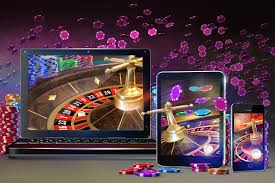
Exploring Virtual Reality in Bangladeshi: A New Frontier
As technology advances, the potential for virtual reality (VR) to revolutionize sectors in Bangladesh becomes increasingly apparent. From education and training to gaming and tourism, VR is emerging as a game-changer. With platforms like Exploring Virtual Reality in Bangladeshi Online Casino Apps bet9ja shop.com paving pathways for innovation, the possibilities are extensive.
In the education sector, VR is being adopted to enhance learning experiences. Traditional methods often lack engagement and interactivity. However, VR can provide immersive learning environments where students can explore complex subjects in a virtual setting. Imagine a biology class where students can dissect a virtual frog or a history lesson that allows them to walk through ancient temples. This level of interaction not only enhances understanding but also boosts retention rates among students.
The Bangladeshi government recognizes the importance of integrating technology into education. Initiatives are being launched to equip educational institutions with VR technologies, making learning more accessible and engaging for students across the country. VR labs and technology hubs are becoming commonplace, encouraging students to explore STEM fields through interactive simulations.
Additionally, the entertainment industry in Bangladesh sees a burgeoning relationship with VR. Local game developers are venturing into VR gaming, creating unique experiences that cater to the cultural narratives of Bangladesh. By developing games that reflect local stories and folklore, developers are able to engage a wider audience and foster national pride. The prospect for VR games is not just limited to entertainment; they are also being used for therapeutic purposes, aiding in mental health treatments and providing stress relief.
Another exciting application of VR is in the tourism sector. Bangladesh, with its rich cultural heritage and beautiful natural landscapes, is an ideal candidate for virtual tourism. Potential travelers can take virtual tours of historical places like the Sundarbans or the ancient city of Paharpur before setting foot there. This not only sparks interest in tourism but can significantly boost the economy by enticing tourists who are curious about experiencing Bangladesh.
Virtual reality can also offer real estate developers a unique platform to showcase properties. Clients can take virtual walkthroughs of homes, allowing them to visualize spaces without ever needing to visit in person. This is particularly beneficial in a densely populated urban environment like Dhaka, where time-efficient solutions are necessary.

The challenges of integrating VR in Bangladesh are significant as well. Issues such as high costs, limited awareness, and the need for robust internet infrastructure complicate widespread adoption. Efforts to educate the public about the benefits of VR can help increase demand, thus fueling investment from both public and private sectors to improve the necessary infrastructure.
There is also a pressing need for skilled professionals in VR technology. As the industry grows, educational institutions must adapt their curricula to prepare students for careers in this field. Collaborations between universities and the tech industry can help create training programs that equip future professionals with the skills they need to thrive in VR, AR (augmented reality), and MR (mixed reality) environments.
The creative industries are also exploring the potential of VR. Artists, filmmakers, and musicians are beginning to utilize VR to create works that allow audiences to experience their art in new and immersive ways. From VR film festivals to virtual exhibitions, creators have a new medium through which to express themselves and connect with their audience.
In healthcare, VR is gradually being recognized for its potential in medical training and patient rehabilitation. Medical students can practice surgeries in a controlled, risk-free environment, ensuring they gain valuable experience before interacting with real patients. For patients, VR can serve as a tool for rehabilitation, helping them cope with pain or anxiety through immersive experiences that distract them from their condition.
The potential for VR in Bangladesh is immense, but it requires collective effort. Government support, private investment, and public interest must align to fully leverage the capabilities of this transformative technology. As more businesses and educational institutions explore VR opportunities, the landscape of technology in Bangladesh will continue to evolve rapidly.
In conclusion, exploring virtual reality in Bangladesh opens doors to a multitude of opportunities across various sectors. Whether in the classroom, at home, or in industries like real estate, healthcare, and tourism, VR has the capacity to change lives for the better. As we delve deeper into this new frontier, it’s essential to foster a culture of innovation and exploration—ensuring that Bangladesh remains at the forefront of the global technology scene.